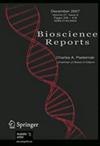作为抗肥胖和神经保护剂的厌食神经肽。
IF 3.8
3区 生物学
Q2 BIOCHEMISTRY & MOLECULAR BIOLOGY
引用次数: 0
摘要
自 1975 年以来,肥胖症的发病率已上升到流行病的程度,肥胖症患者的人数增加了四倍。肥胖是罹患其他严重疾病(如 2 型糖尿病、高血压和心血管疾病)的主要风险因素。最近的流行病学研究将肥胖定义为神经退行性疾病(如阿尔茨海默病和其他类型的痴呆症)的危险因素。尽管肥胖症会引发这些严重的并发症,但目前仍缺乏有效的抗肥胖治疗方法。厌食症神经肽是治疗肥胖症的有望候选药物。厌食症神经肽是由下丘脑或脑干等与食物摄入调节有关的脑区神经元产生的多肽。这些肽能有效减少食物摄入量和体重。此外,由于肥胖与罹患注意力缺失症的风险之间已被证实存在相互关联,因此这两种制剂在神经变性动物模型中的潜在神经保护作用也得到了研究。本综述旨在探讨在大脑中产生和发挥作用的厌食神经肽,强调它们不仅在治疗肥胖症方面具有潜力,而且在治疗神经退行性疾病方面也具有潜力。本文章由计算机程序翻译,如有差异,请以英文原文为准。
Anorexigenic neuropeptides as anti-obesity and neuroprotective agents.
Since 1975, the incidence of obesity has increased to epidemic proportions, and the number of patients with obesity has quadrupled. Obesity is a major risk factor for developing other serious diseases, such as type 2 diabetes mellitus, hypertension, and cardiovascular diseases. Recent epidemiologic studies have defined obesity as a risk factor for the development of neurodegenerative diseases, such as Alzheimer's disease (AD) and other types of dementia. Despite all these serious comorbidities associated with obesity, there is still a lack of effective antiobesity treatment. Promising candidates for the treatment of obesity are anorexigenic neuropeptides, which are peptides produced by neurons in brain areas implicated in food intake regulation, such as the hypothalamus or the brainstem. These peptides efficiently reduce food intake and body weight. Moreover, because of the proven interconnection between obesity and the risk of developing AD, the potential neuroprotective effects of these two agents in animal models of neurodegeneration have been examined. The objective of this review was to explore anorexigenic neuropeptides produced and acting within the brain, emphasizing their potential not only for the treatment of obesity but also for the treatment of neurodegenerative disorders.
求助全文
通过发布文献求助,成功后即可免费获取论文全文。
去求助
来源期刊

Bioscience Reports
生物-细胞生物学
CiteScore
8.50
自引率
0.00%
发文量
380
审稿时长
6-12 weeks
期刊介绍:
Bioscience Reports provides a home for sound scientific research in all areas of cell biology and molecular life sciences.
Since 2012, Bioscience Reports has been fully Open Access and publishes all papers under the liberal CC BY licence, giving the life science community quality research to share and discuss.Content before 2012 is subscription-only, and is accessible via archive purchase.
Articles are assessed on soundness, providing a home for valid findings and data.
We welcome papers that span disciplines (e.g. chemistry, medicine), including papers describing:
-new methodologies
-tools and reagents to probe biological questions
-mechanistic details
-disease mechanisms
-metabolic processes and their regulation
-structure and function
-bioenergetics
 求助内容:
求助内容: 应助结果提醒方式:
应助结果提醒方式:


